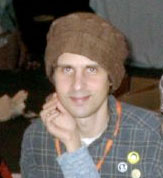A Quote by Philippa Perry
After a stroke we can re-learn how to talk, because by practicing we can establish different pathways in the brain, circumnavigating the damaged part.
Related Quotes
Through my life and my experience, I believe getting "positive mental attitude" is true. Your brain has certain pathways in it, and if you feed those pathways with certain types of thoughts, the blood goes to those neurons and nourishes them, and they grow and develop. That's how you build habits. Physically, I think that's how your brain works. If you have certain habits that are negative and causing you problems that you want to change them, you can actually change the blood flow and stuff in your brain by thinking a different way.
We are not born with effective vision. The human infant has to learn how to see. The eyes gather information, they transmit it to the brain, but the brain doesn't know how to process it yet. We learn how to see in a way that's very similar to the way we learn how to speak. It takes a couple of years.
What we found was that rather than being haphazardly arranged or independent pathways, we find that all of the pathways of the brain taken together fit together in a single exceedingly simple structure. They basically look like a cube. They basically run in three perpendicular directions, and in each one of those three directions the pathways are highly parallel to each other and arranged in arrays. So, instead of independent spaghettis, we see that the connectivity of the brain is, in a sense, a single coherent structure.
Have things to look forward to: Plan a trip, treat yourself to the spa, make plans in the future so that you can focus on what you're looking forward to versus how unbearable your present is. Understand that your brain is detaching. It's the same part of the brain that is activated as a cocaine user feening for their next fix. You're literally in withdrawal. Understand that it takes time for your brain and neural pathways to detach. You're not going crazy - it's just a process, and that process takes time.
I am interested in levels of brain discourse. How articulate are the voices in your head? You know, there's a different voice for the phone, and a different voice if you're talking in bed. When you're starting off with a narrator, it's interesting to think, where is their voice coming from, what part of their brain?
Even my colleagues don't read classic criticism. And my feeling is that if you don't do that then you're not really practicing your craft. That's how you learn how to do it. You don't learn how to write about jazz just from listening to jazz. You learn how to write by reading the great writers and how they worked, the great music critics.
A fixed habit is supported by old, well-worn pathways in the brain. When you make conscious choices to change a habit, you create new pathways. At the same time, you strengthen the decision-making function of the cerebral cortex while diminishing the grip of the lower, instinctual brain. So without judging your habit, whether it feels like a good one or a bad one, take time to break the routine, automatic response that habit imposes.
All sorts of things can keep one awake. But as you get older - this is what the stroke thing really brought home to me - this thing that I never paid attention to: my brain. I've always been conscious that, of course, after a night of getting stoned, my head would feel foggy; if I got drunk the night before I'd be hungover. But that was the extent of my concern about my brain. And then with the stroke thing, it made me realize, "God! That's my main source of income." So it relates actually to your other question about growing old.
I wanted to take a damaged individual in a damaged society with damaged relationships between nations and take a look at how this individual survives amongst them, and that for me as a writer is the connection that you needed to get inside the skin of the main character and wonder how he's going to cope with all this.





































